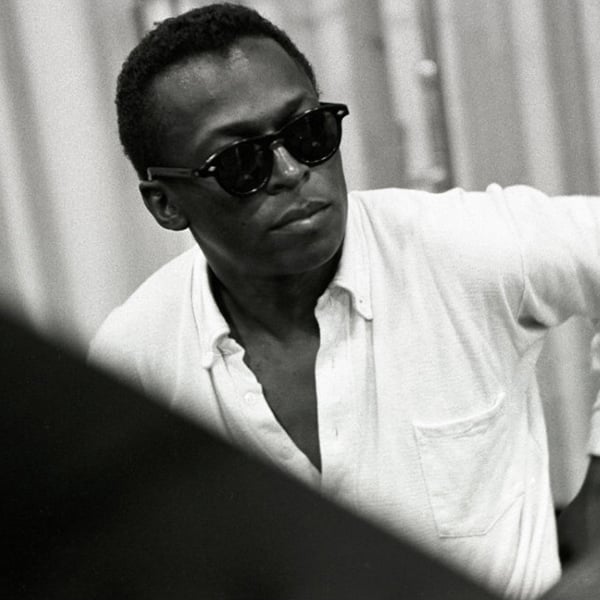
Miles’ 1954 Prestige recordings are rife with evidence of his post-addiction revival. His trumpet playing had become instantly recognizable, economically phrased and emotionally consistent. He began to record with a mute, adding even more vulnerability to his voice, to emphasize that withdrawn quality. In April, he recorded two sessions for Prestige, the first entirely with a cup mute and with a quintet that showed Miles’ color-blind view of musical talent; the alto saxophonist David Schildkraut ably complements Miles on the three tracks on Miles Davis Quintet, including “Solar,” another tune credited erroneously to Miles (it was written by guitarist Chuck Wayne as “Sonny”) yet which became a signature tune.
With the session for Miles Davis All Star Sextet later that same month, the trumpeter amped up both the personnel and material, bringing together a well-chosen group of fellow bebop refugees plus one newcomer destined for hard-bop greatness (Lucky Thompson, J.J. Johnson, Percy Heath, Kenny Clarke and a young Horace Silver) to perform an eight-minute version of Dizzy Gillespie’s classic “Blue ‘N’ Boogie,” and even more impressively, a 13-minute, mid-tempo, relaxed version of Gene Ammon’s “Gravy,” reshaped, smoothed and retitled “Walkin.’”
Miles really liked the tune—it would stay in his book for years. He first recorded the tune as “Weirdo” for Blue Note in 1952, and would restructure and record it as “Sid’s Ahead” for Columbia in 1958, but as “Walkin,’” it achieved a balance of swing, earthiness and sophistication that would help sway many jazzmen to a new way of playing modern jazz that was soon labeled Hard Bop. Miles himself had come up with the arrangement on the spot; Thompson had been charged with coming up with the chart, but had not delivered. Miles’ own solo was a standout of economy and hushed feeling.
Jazz historian Martin Williams hailed it a watershed for the trumpeter. “Beginning now, one passionate note from Miles Davis seemed to imply a whole complex of expressive sound, and three notes a ravishing melody.” Miles himself noted the popular reaction: That record was a motherfucker man . . . the critics’ heads were still someplace else, but a few people were starting to buy my albums.”





